Ossining, New York | |
|---|---|
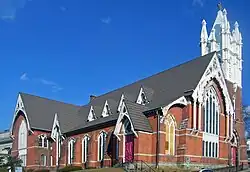 | |
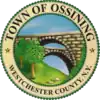 Seal | |
| Nickname: The Volunteer-Spirited Town | |
_highlighted.svg.png.webp) Location of Ossining (town), New York | |
| Coordinates: 41°9′45.47″N 73°51′41.75″W / 41.1626306°N 73.8615972°W | |
| Country | United States |
| State | New York |
| County | Westchester |
| Government | |
| • Type | Manager-Council |
| • Town Supervisor | Elizabeth Feldman (D) |
| Area | |
| • Total | 6.45 sq mi (16.71 km2) |
| • Land | 3.17 sq mi (8.20 km2) |
| • Water | 3.29 sq mi (8.51 km2) |
| Population (2020) | |
| • Total | 40,061 |
| • Density | 6,200/sq mi (2,400/km2) |
| • Demonym | Ossinaut |
| Time zone | UTC−5 (Eastern (EST)) |
| • Summer (DST) | UTC−4 (EDT) |
| ZIP Code | 10562 |
| Area code | 914 |
| FIPS code | 36-55530 |
| GNIS feature ID | 0959520 |
| Website | Official website |
Ossining (/ˈɒsɪnɪŋ/ OSS-in-ing) is a town located along the Hudson River in Westchester County, New York. The population was 40,061 at the time of the 2020 census. It contains two villages, the Village of Ossining and part of Briarcliff Manor, the rest of which is located in the Town of Mount Pleasant. Ossining is the location of Sing Sing maximum-security prison.
Geography
According to the United States Census Bureau, the town has a total area of 15.6 square miles (40.4 km2), of which 11.7 square miles (30.3 km2) is land and 3.9 square miles (10.1 km2) (25.06%) is water.
Ossining is bounded on the west by the Hudson River and on the north by the Croton River.
History
Frederick Philipse bought the area which presently constitutes the Town of Ossining from the Sint Sinck Indians in 1685. The Sint Sinck were members of the Matinecock (Algonquin) tribe, who originally resided in the area of Cow Neck Peninsula on Long Island, New York.[2] His Manor extended from Spuyten Duyvil Creek on the border between present-day Manhattan and the Bronx to the Croton River. The last Lord of the Manor, Frederick Philipse III, was a Loyalist in the American Revolutionary War who fled to England. The State of New York confiscated the manor in 1779.
In 1813, the village of Sing Sing was incorporated. Sing Sing Prison, now known as Sing Sing Correctional Facility, which is a maximum-security prison, opened in 1826.[3] The prison was opened to replace the Newgate Prison, located in New York City.[3] In 1845, the New York State Legislature created a new town out of the northern part of what had been the Town of Mount Pleasant. A local Indian authority suggested the town be named Ossinsing, a different form of the name Sing Sing. One year later the last "s" was removed for ease in pronunciation. In 1901, to prevent confusion of goods made in the village with Sing Sing prison-made items, local officials had the village name changed to Ossining as well.
In 1902 an area southeast of the village of Ossining, then known as Whitson's Corners, was incorporated as the village of Briarcliff Manor.
The Jug Tavern and Scarborough Historic District are listed on the National Register of Historic Places.[4]
Demographics
| Census | Pop. | Note | %± |
|---|---|---|---|
| 1850 | 4,939 | — | |
| 1860 | 6,766 | 37.0% | |
| 1870 | 7,798 | 15.3% | |
| 1880 | 8,760 | 12.3% | |
| 1890 | 10,058 | 14.8% | |
| 1900 | 10,895 | 8.3% | |
| 1910 | 12,828 | 17.7% | |
| 1920 | 12,358 | −3.7% | |
| 1930 | 17,724 | 43.4% | |
| 1940 | 18,911 | 6.7% | |
| 1950 | 20,137 | 6.5% | |
| 1960 | 26,199 | 30.1% | |
| 1970 | 32,397 | 23.7% | |
| 1980 | 30,680 | −5.3% | |
| 1990 | 34,124 | 11.2% | |
| 2000 | 36,534 | 7.1% | |
| 2010 | 37,674 | 3.1% | |
| 2020 | 40,061 | 6.3% | |
| U.S. Decennial Census[5][6] | |||
In the census[7] of 2000, there were 36,534 people, 12,355 households, and 8,537 families residing in the town. The population density was 3,123.0 inhabitants per square mile (1,205.8/km2). There were 12,733 housing units at an average density of 1,088.4 per square mile (420.2/km2). The racial makeup of the town was 70.26% White, 14.28% Black or African American, 0.35% Native American, 4.54% Asian, 0.02% Pacific Islander, 7.34% from other races, and 3.21% from two or more races. Hispanic or Latino of any race were 19.93% of the population.
There were 12,355 households, out of which 33.1% had children under the age of 18 living with them, 54.4% were married couples living together, 10.7% had a female householder with no husband present, and 30.9% were non-families. Of all households 25.5% were made up of individuals, and 9.0% had someone living alone who was 65 years of age or older. The average household size was 2.64 and the average family size was 3.14.
In the town, 21.8% of the population was under the age of 18, 7.8% from 18 to 24, 34.5% from 25 to 44, 22.9% from 45 to 64, and 13.0% was 65 years of age or older. The median age was 37 years. For every 100 females, there were 106.1 males. For every 100 females age 18 and over, there were 105.4 males.
The median income for a household in the town was $65,485, and the median income for a family was $81,943 (these figures had risen to $77,753 and $98,593 respectively as of a 2007 estimate[8]). Males had a median income of $51,286 versus $40,618 for females. The per capita income for the town was $34,195. About 5.0% of families and 8.4% of the population were below the poverty line, including 8.3% of those under age 18 and 9.2% of those age 65 or over.
Government
The Town of Ossining is governed by a town supervisor and a four-member town board. It comprises two incorporated villages, Village of Ossining and Village of Briarcliff Manor, each of which has a mayor and a village board. Each village maintains its own police department and village justice court. In addition to the two incorporated villages, there is an unincorporated section of the town that is not part of either village. The unincorporated section of the town has its own highway department. Fire, EMS and water services are provided by either the Village of Ossining or the Village of Briarcliff Manor. Law enforcement services for the unincorporated section of the town are provided through an inter-municipal agreement with the Village of Ossining Police Department (the town's police department was disbanded in 2011).
Education
Ossining Union Free School District operates public schools, including Ossining High School.
The Ossining Public Library, originally chartered in 1893 as the Sing Sing Public Library, serves the residents of the Village and Town of Ossining, and of the Ossining School District. The current library collections include 110,000 books, 25,000 non-print items, and 300 newspaper and magazine titles. As a charter member of the 38-member Westchester Library System, the Ossining Public Library offers its patrons access to the more than one million holdings of the other county libraries. A $15.8-million building program was started in 2005 to replace the 1960s-era facility with a new 48,000-square-foot (4,500 m2) building. The new Ossining Public Library opened in March 2007 and added many new or enhanced services, including over 50 public Internet terminals, a 250-seat theater, an art gallery, and the county's first radio frequency (RFID) circulation system.[9]
Notable people
- David T. Abercrombie, co-founder of Abercrombie & Fitch
- Jason Robert Brown, musical theatre composer, lyricist, and playwright
- Northern Calloway, actor, David on Sesame Street
- John Cheever, author
- John Chervokas, advertising executive
- Jennifer Cihi, singer (Broadway/television)
- Ted Daniel, jazz trumpeter
- Kara DioGuardi, singer-songwriter
- Meredith Dixon, member of the New Mexico House of Representatives
- Peter Falk, actor
- Albert Fish, serial killer
- Mike da Fonte, professional soccer player
- Anne Francis, actress
- Khalid Khannouchi, American record holder for the marathon
- Erica Leerhsen, actress[10]
- Ingersoll Lockwood (1841–1918), lawyer and writer, author of the Baron Trump novels[11]
- Jamie Loeb (born 1995), tennis player
- Fonda Rae, singer
- Sonny Sharrock, jazz guitarist
- Jesse Lee Soffer, actor
- Matt Striker, WWE interviewer and commentator
- Igby Rigney, actor
In popular culture
Don Draper, the primary protagonist of Mad Men, lives with his family in Ossining.
Gallery
 Painting by Samuel Colman of the view looking north from Ossining (1867)
Painting by Samuel Colman of the view looking north from Ossining (1867) A photograph of Sing Sing Prison from about the same time (c.1863-1885)
A photograph of Sing Sing Prison from about the same time (c.1863-1885)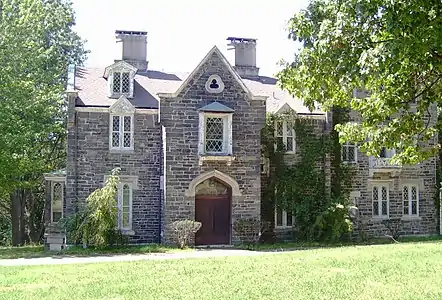 Like most of the river towns along the Hudson in the middle- to late-19th century, Ossining was the location of the mansions and estates of the rich. The Kane Mansion was built in 1843....
Like most of the river towns along the Hudson in the middle- to late-19th century, Ossining was the location of the mansions and estates of the rich. The Kane Mansion was built in 1843....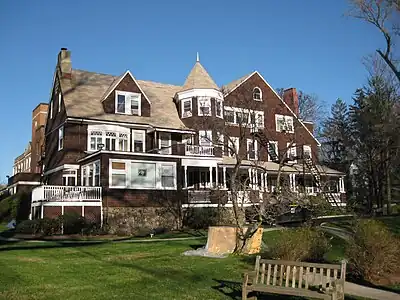 ...while "Hillside", the house of General Edwin McAlpin, was built prior to 1895
...while "Hillside", the house of General Edwin McAlpin, was built prior to 1895 Two arched bridges cross Sing Sing Kill in Ossining. Broadway is carried on the lower bridge, while the Croton Aqueduct was carried on the upper one
Two arched bridges cross Sing Sing Kill in Ossining. Broadway is carried on the lower bridge, while the Croton Aqueduct was carried on the upper one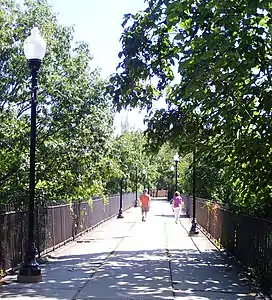 The upper bridge is today used as a pedestrian bridge, and is part of the state Old Croton Aqueduct Trail
The upper bridge is today used as a pedestrian bridge, and is part of the state Old Croton Aqueduct Trail
References
- ↑ "ArcGIS REST Services Directory". United States Census Bureau. Retrieved September 20, 2022.
- ↑ "What is Sint Sink?".
- 1 2 Andress, Richard (1992). "Guide to Records of the Department of Correctional Services" (PDF). New York State Archives. Publication FA07. Retrieved October 14, 2015.
- ↑ "National Register Information System". National Register of Historic Places. National Park Service. March 13, 2009.
- ↑ "Census of Population and Housing". Census.gov. Retrieved June 4, 2016.
- ↑ "United States Census Bureau QuickFacts". United States Census Bureau. Retrieved February 26, 2022.
- ↑ "U.S. Census website". United States Census Bureau. Retrieved January 31, 2008.
- ↑ "American FactFinder - Community Facts". archive.ph. February 11, 2020. Archived from the original on February 11, 2020. Retrieved November 28, 2021.
- ↑ "Ossining Public Library". Archived from the original on November 9, 2010. Retrieved September 23, 2010.
- ↑ Barron, Sam (February 4, 2016). "Actor Returns Home To Westchester To Screen New Film". Daily Voice. Retrieved September 2, 2016.
- ↑ New York Times (1918-10-03). "Ingersoll Lockwood, Lawyer", p. 13. The New York Times, 3 October 1918. Retrieved from https://timesmachine.nytimes.com/timesmachine/1918/10/03/98271682.pdf.
External links
- Town of Ossining official web site
- Town of Ossining public safety
- Village of Ossining
- Ossining Public Library
- Ossining.com: Ossining, NY's Hometown Web-newspaper
- Hudson Valley Arts and Science
- InOssining.com: Ossining events, parks, neighborhoods and tours
- Tocqueville in Ossining - Segment from C-SPAN's Alexis de Tocqueville Tour



